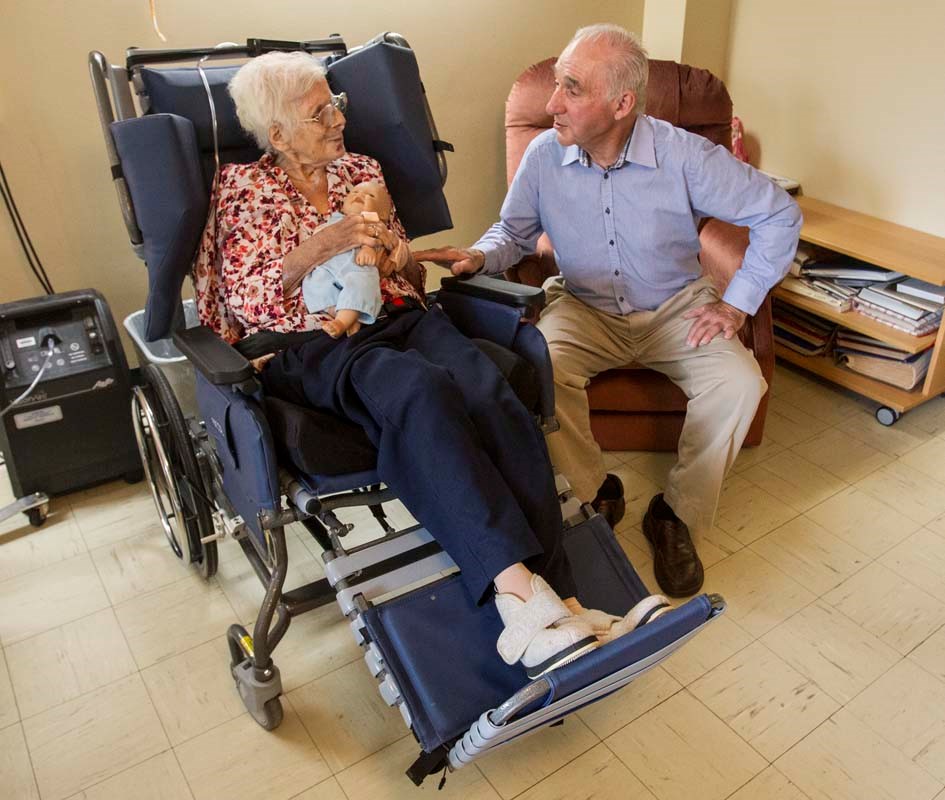Several months ago when Marcel Normandeau went to visit his aunt Yvonne Verlinde at Youville Home, he was prepared to help feed her lunch.
Several months ago when Marcel Normandeau went to visit his aunt Yvonne Verlinde at Youville Home, he was prepared to help feed her lunch.
“‘No,' she said, and started eating and drinking by herself, which really surprised me,” said Normandeau.
He also noticed Verlinde was more awake and alert than usual.
At her 98th birthday party in July, she read her birthday cards and thanked everyone individually. She has 33 nieces and nephews.
Verlinde was one of 250 participants in an Alberta Health Services (AHS) pilot project on appropriate use of anti-psychotics in long-term care facilities. Youville Home was one of two Covenant Health sites, and one of 11 provincial sites in total, selected to be part of the project when it launched in June 2013.
“When we first started, we had 33 per cent of our residents on antipsychotics,” said Dawn Gammon, nurse practitioner and project lead at Youville.
Antipsychotics are often prescribed in hospitals and their use is carried on into long-term care. In Verlinde's case, she was prescribed antipsychotics during a seven-week hospital stay before coming to Youville in 2009.
In accordance with provincial guidelines, Youville staff would perform medication reviews for patients on antipsychotics once per month. During reviews, she noticed there was a lack of information as to why antipsychotics were prescribed in the first place.
“These are medications we need, but they are chemical restraints. They are needed when you are at risk to yourself or at risk to other people,” said Gammon.
Over-sedation, increased risk of falls, strokes, confusion, aspiration pneumonia and loss of independence are just some of the side effects antipsychotics have on elderly patients.
“They only work on 20 people out of every 100 that take them,” added Gammon, citing research out of the United Kingdom.
When staff began taking patients off the medications (after closely monitoring their behaviours) and taking a closer look at how they managed dementia care beyond traditional therapies, personalities came out, said Gammon.
“Some had no changes. Some people's behaviours changed by putting teddy bears in their hands and putting warm blankets on them, or the time of day they take a shower.”
One woman would hit and kick people because she didn't want to bathe in the morning, explained Gammon. When they changed her bath time to the evening, “she would roll down the hall and say, ‘I'm going on a hot date!'”
Being allowed to sleep in has made big difference for his aunt, noted Normandeau. “She feels more comfortable,” he said.
The project has helped improve team-based care (without the need for additional staff) and has provided a closer look at drugs prescribed to elderly patients, especially antipsychotics being used as a first-line treatment for dementia, said Gammon.
The project trial at the 11 sites ended in February. Preliminary data from the Seniors Health Strategic Clinical Network shows that as of January 50 per cent cent of participants are no longer using antipsychotics.
The number at Youville has dropped from 66 to five.
The project is being rolled out at both Covenant Health and AHS sites across the province.
“It's treating them like they're your family – when somebody is scared you give them hugs, not drugs,” said Gammon.
